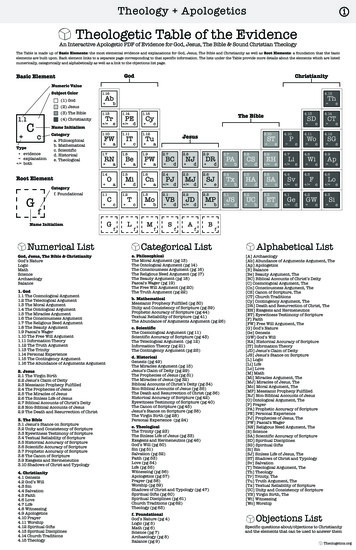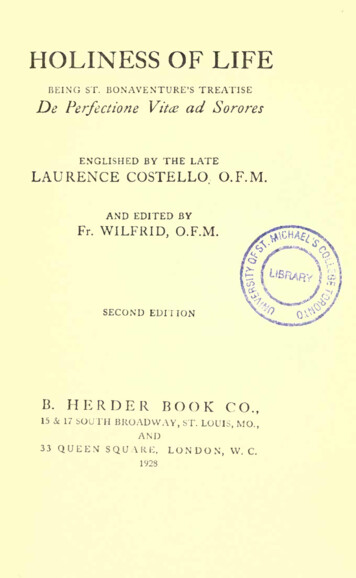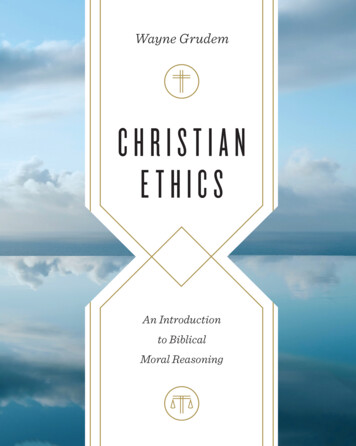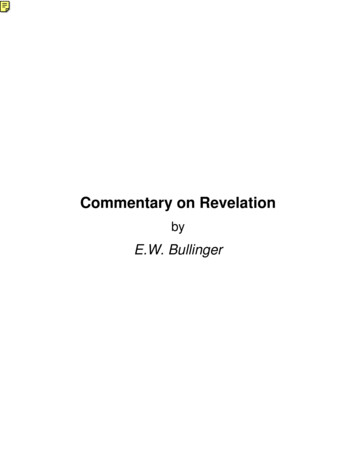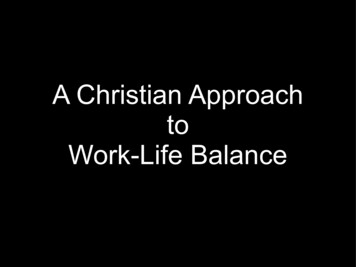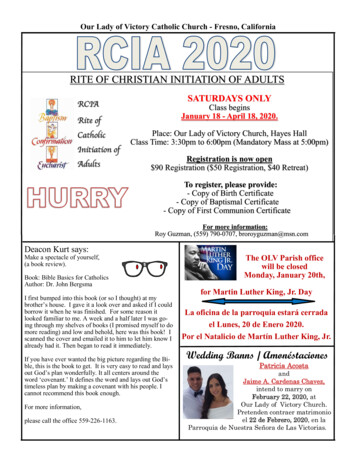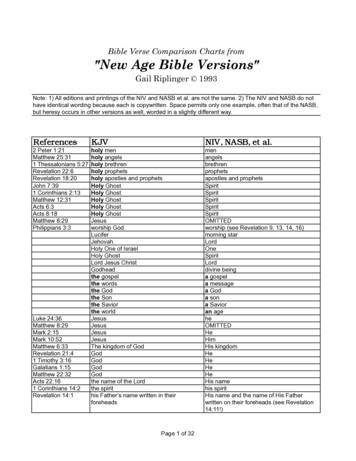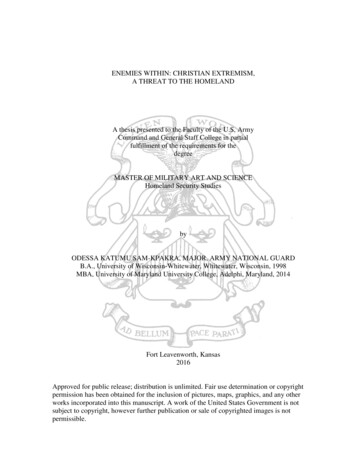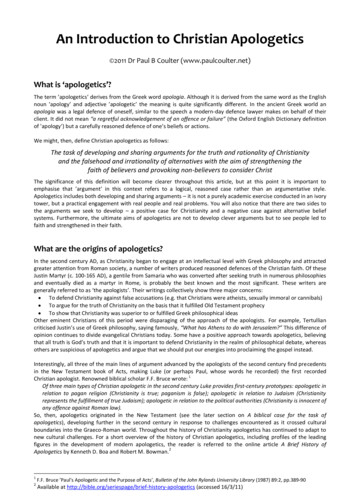
Transcription
An Introduction to Christian Apologetics 2011 Dr Paul B Coulter (www.paulcoulter.net)What is ‘apologetics’?The term ’apologetics’ derives from the Greek word apologia. Although it is derived from the same word as the Englishnoun ’apology’ and adjective ’apologetic’ the meaning is quite significantly different. In the ancient Greek world anapologia was a legal defence of oneself, similar to the speech a modern-day defence lawyer makes on behalf of theirclient. It did not mean “a regretful acknowledgement of an offence or failure” (the Oxford English Dictionary definitionof ’apology’) but a carefully reasoned defence of one’s beliefs or actions.We might, then, define Christian apologetics as follows:The task of developing and sharing arguments for the truth and rationality of Christianityand the falsehood and irrationality of alternatives with the aim of strengthening thefaith of believers and provoking non-believers to consider ChristThe significance of this definition will become clearer throughout this article, but at this point it is important toemphasise that ’argument’ in this context refers to a logical, reasoned case rather than an argumentative style.Apologetics includes both developing and sharing arguments – it is not a purely academic exercise conducted in an ivorytower, but a practical engagement with real people and real problems. You will also notice that there are two sides tothe arguments we seek to develop – a positive case for Christianity and a negative case against alternative beliefsystems. Furthermore, the ultimate aims of apologetics are not to develop clever arguments but to see people led tofaith and strengthened in their faith.What are the origins of apologetics?In the second century AD, as Christianity began to engage at an intellectual level with Greek philosophy and attractedgreater attention from Roman society, a number of writers produced reasoned defences of the Christian faith. Of theseJustin Martyr (c. 100-165 AD), a gentile from Samaria who was converted after seeking truth in numerous philosophiesand eventually died as a martyr in Rome, is probably the best known and the most significant. These writers aregenerally referred to as ‘the apologists’. Their writings collectively show three major concerns: To defend Christianity against false accusations (e.g. that Christians were atheists, sexually immoral or cannibals) To argue for the truth of Christianity on the basis that it fulfilled Old Testament prophecy To show that Christianity was superior to or fulfilled Greek philosophical ideasOther eminent Christians of this period were disparaging of the approach of the apologists. For example, Tertulliancriticised Justin’s use of Greek philosophy, saying famously, “What has Athens to do with Jerusalem?” This difference ofopinion continues to divide evangelical Christians today. Some have a positive approach towards apologetics, believingthat all truth is God’s truth and that it is important to defend Christianity in the realm of philosophical debate, whereasothers are suspicious of apologetics and argue that we should put our energies into proclaiming the gospel instead.Interestingly, all three of the main lines of argument advanced by the apologists of the second century find precedentsin the New Testament book of Acts, making Luke (or perhaps Paul, whose words he recorded) the first recordedChristian apologist. Renowned biblical scholar F.F. Bruce wrote: 1Of three main types of Christian apologetic in the second century Luke provides first-century prototypes: apologetic inrelation to pagan religion (Christianity is true; paganism is false); apologetic in relation to Judaism (Christianityrepresents the fulfillment of true Judaism); apologetic in relation to the political authorities (Christianity is innocent ofany offence against Roman law).So, then, apologetics originated in the New Testament (see the later section on A biblical case for the task ofapologetics), developing further in the second century in response to challenges encountered as it crossed culturalboundaries into the Graeco-Roman world. Throughout the history of Christianity apologetics has continued to adapt tonew cultural challenges. For a short overview of the history of Christian apologetics, including profiles of the leadingfigures in the development of modern apologetics, the reader is referred to the online article A Brief History of2Apologetics by Kenneth D. Boa and Robert M. Bowman.12F.F. Bruce ’Paul's Apologetic and the Purpose of Acts’, Bulletin of the John Rylands University Library (1987) 89:2, pp.389-90Available at ics (accessed 16/3/11)
P a g e 2An Introduction to Christian Apologetics 2011, Dr Paul B Coulter (www.paulcoulter.net)What is the purpose of apologetics?Apologetics is generally said to have three functions, although it should be realised that not all Christian apologistsaccept that all three functions are valid (some would say that we should not try to construct positive arguments forChristian faith but simply focus on refuting accusations against it) and there is considerable variation between differentschools of apologetics as to what arguments should be used within each function:1) Arguments for the truth of the Christian faith (vindication / proof / positive apologetics)Aim – to show that Christianity is reasonable / rational. Using philosophical arguments and evidence from science,archaeology and history to show that the Christian faith has greater power than any alternative belief system toexplain and interpret the world we live in.2) Arguments refuting accusations made against the Christian faith (defence / negative apologetics)Aim – to show that Christianity is not unreasonable / irrational. Removing objections that are made againstChristianity, for example claims of contradictions in the Bible, alternative interpretations of historical and scientificevidence and misconceptions about Christian belief.3) Refutation of opposing beliefs (offense)Aim – to show that non-Christian belief systems are unreasonable / irrational. Focuses not on specific attacksagainst Christianity but on undermining the foundations of other belief systems.Some writers add a fourth function, namely persuasion. They claim that apologetics also aims to persuade people tobelieve in the Christian message. It is probably better to see the task of persuasion as the overarching aim ofapologetics, with the three functions above playing different parts within it. This is a helpful reminder of the fact thatapologetics alone is not enough – evangelism is also necessary.Another way to think about the purpose of apologetics is to think about how it relates to those who are believers andthose who are non-believers. Apologetics aims both to strengthen the faith of the faithful and to remove obstacles tofaith for those who do not believe.How does apologetics relate to evangelism?“Evangelism” is generally understood to mean sharing the good news message (gospel) about Jesus Christ. Apologeticsis best seen as either pre-evangelism or as part of the process of evangelism. It removes barriers to belief and preparesthe ground for the seed of the gospel to be sown. It is vital not to divorce apologetics strictly from evangelism. It isunlikely that people who have intellectual objections to the existence of God or the historicity of Jesus will receive thegospel message, and apologetics will help to remove these obstacles by appealing to intellectual reasoning. At the sametime, a person could be intellectually convinced of the credibility and even the truth of the Christian faith but still not bea Christian. The gospel appeals not only to the mind, it also appeals to the emotions and, most importantly of all, to thewill. Conversion occurs when mind, heart and will are surrendered to God in repentance and faith. As such it will oftenbe wise to share the gospel as we engage in apologetic arguments.Approaches to apologeticsThere are numerous different ways to approach the task of apologetics and it is not always easy to classify differentapproaches. No one scheme of classification gains universal support. Two possible ways of classifying commonapproaches are:a) Depending on the approach to knowing truth about God (i.e. religious epistemologies)Can truth about God be discovered through human reason in response to observations about the world(empiricism), through a critical appraisal of the inherent logic of different belief systems (rationalism), throughScripture alone (Biblical authoritarianism), through personal experience (mysticism), or through a combination ofthese means? The debate over these different means of discovering truth about God depends on our belief about: God – is greater stress placed on His transcendence (the fact that He is beyond our knowing) or Hisimmanence (the fact that He has revealed Himself to us and can be known). Sin – how has sin affected the ability of humans to apprehend truth about God (the effects of sin on the mindare called the noetic effects of sin).Differing emphases on God’s transcendence and the noetic effects of sin lead to three distinct starting points forapologetics, as the following table shows:
P a g e 3An Introduction to Christian Apologetics 2011, Dr Paul B Coulter (www.paulcoulter.net)Transcendence of GodNoetic effects of sinStrong emphasis on bothLess strongly emphasisedLess stronglyemphasisedStrongly emphasisedStarting point forapologeticsThe unique Christianexperience of graceProofs from nature andhistoric evidencesScripture (God’srevelation)Historic examplesBlaise Pascal; SørenKierkegaard; Emil BrunnerThomas Aquinas; JosephButler; Dominic TennantAugustine of Hippo; JeanCalvin; Abraham KuyperHow can God beknown?FaithReasonFaith and reasonb) Depending on the way arguments are constructedSteven B. Cowan argues for a more practical classification of apologetic methods on the basis of “distinctive ways of3presenting the case for Christianity, distinctive types or structures of argument.” He identifies five approaches:1) Classical method (e.g. William Lane Craig, R.C. Sproul, Norman Geisler, Stephen T. Davis, Richard Swinburne)Aims to establish theism through arguments from nature then to present evidences to prove that Christianity isthe correct version of theism. Most proponents of this method claim that there is no point presentingarguments from historical evidence until the person has embraced a theistic worldview as they will alwaysinterpret them based on their own worldview2) Evidential method (e.g. Gary R. Habermas, John W. Montgomery, Clark Pinnock, Wolfhart Pannenberg) Usesboth historical and philosophical arguments but focuses primarily on historical and other evidence for the truthof Christianity. Will argue at the same time both for theism in general and Christianity in particular.3) Cumulative case method (e.g. Paul D. Feinberg, Basil Mitchell, C.S. Lewis, C. Stephen Evans) Rather thanapproaching the task as a formal logical argument, sees the case for Christianity as more like the brief a lawyermakes in a law court – an informal argument drawing together evidence that together makes a compelling casewith which no other hypothesis can compete.4) Presuppositional method (e.g. John M. Frame, Cornelius Van Til, Gordon Clark, Greg Bahnsen, FrancisSchaeffer) Emphasises the noetic effects of sin to the degree that believers and unbelievers will not shareenough common ground for the preceding three methods to accomplish their goal. The apologist mustpresuppose the truth of Christianity as the proper starting point for apologetics. All experience is interpretedand all truth known through the Christian revelation in the Scriptures.5) Reformed epistemology method (e.g. Kelly James Clark, Alvin Platinga, Nicholas Wolterstorff, GeorgeMavrodes, William Alston) Argues that people believe many things without evidence and that this is perfectlyreasonable. Although positive arguments in defence of Christianity are not necessarily wrong, belief in Goddoes not need the support of evidence or argument to be rational. The focus, therefore, tends to be more onnegative apologetics, defending against challenges to theistic belief.The book Cowan edited, entitled Five Views on Apologetics (Zondervan, 2000) contains chapters by proponents ofeach of these five approaches as well are responses to each chapter by the other four contributors. It is a helpful,although fairly technical, attempt to show the commonalities and differences between different approaches.A third way: four methodologiesAlthough I agree that Cowan’s categories are very helpful, I prefer a four-way categorisation of approaches that is usedby Kenneth D. Boa and Robert M Bowman, which combines both the epistemology and the approach to constructingarguments. The four methodologies they identify are Classical apologetics, Evidential apologetics, Reformed apologeticsand Fideism.It should be obvious that three of these four approaches are identical to three of Cowan’s: classical, evidential, andReformed. Cowan’s ’cumulative case method’ is a distinct approach to formulating arguments but since it drawstogether insights from the classical and evidential methods it is not strictly a distinct approach to apologetics. Cowan’spresuppositional method is largely subsumed under Reformed apologetics in this four-fold scheme (a careful reading ofthe descriptions above will show that they have much in common). The fourth approach in the Boa and Bowmanscheme, which is not covered in Cowan’s classification although it shares ground with some people Cowan would classas ’presuppositionalists’, is Fideism. This position correlates to the first line of the table of religious epistemologies, as itidentifies faith as the sole way to know God and appeals to the Christian experience of God’s grace as the onlyappropriate basis for apologetics.The following table, adapted from Boa and Bowman, details the characteristics of these four approaches to apologetics4and the way they tend to deal with some of the most common apologetics issues:34S.B. Cowan ‘Introduction’ in Five Views on Apologetics (Zondervan, 2000), p.14Table adapted from rspectives-apologetics (accessed 15/3/11)
P a g e 4An Introduction to Christian Apologetics 2011, Dr Paul B Coulter iricalTranscendentalParadoxicalPrecursorsAnselm; AquinasWilliam PaleyCalvin; Thomas ReidLuther; KierkegaardthC 20advocatesC. S. Lewis; Norman Geisler J. W. Montgomery; Richard Cornelius Van Til; AlvinSwinburnePlantingaPopular with Catholics; evangelicalsArminiansCalvinistsKarl Barth; Donald BloeschLutherans; neoevangelicalsKnowledgeInternal coherence – usereason to judge betweentruth claimsExternal coherence – arrive Fidelity to Scripture – Godat truth by discovering and as revealed in Scripture isinterpreting factsfoundational for allknowledgeFidelity to Christ – truthabout God is found inencounter with Him, not inthinking about HimFaithFaith is reasonableFaith is not unreasonableUnbelief is unreasonableNot known by reason alonePhilosophyApologetics usesphilosophy’s ideasApologetics usesphilosophy’s toolsApologetics confronts falsephilosophyApologetics confronts allphilosophyHistoryRight view of historyrequires right worldview(objectivity difficult)Right view of historyrequires right method(objectivity possible)Right view of history basedon revelation (objectivetruth found in Scripture)Faith cannot be based onhistorical knowledgeScienceConsistency model:Science, properlyinterpreted, is consistentwith the Christian faithConfirmation model:Science gives factualconfirmation of theChristian faithConflict model:True science depends onthe truth of God’srevelationContrast model:Science deals with physicalmatters; faith deals withthe personalCreation /evolutionTypically genericcreationismTypically old-earthcreationismTypically young-earthcreationismTypically theisticevolutionismExperienceReligious experience notReligious experience mayirrational – test experiences not be reliable – testby worldviewexperiences by factsOrder ofarguments1. Theism; 2. Christ; 3.Scripture as attested byChrist1. Historicity of Scripture; 2. 1. Scripture’s divine claims; First and always, ScriptureChrist and theism; 3.2. Irrationality of allas witness to ChristinspirationalternativesScriptureScripture is subject ofapologetics – rationallyverified authority of GodScripture is source ofapologetics – factuallyverified story about ChristScripture is standard ofapologetics – self-attestingauthority of GodScripture is story ofapologetics – self-attestingstory about ChristFulfilled prophecy provesinspiration if God existsFulfilled prophecy provesinspiration, therefore GodexistsFulfilled prophecypresupposes inspirationFulfilled prophecy is God’sadvance witness to ChristReligionsDisprove the worldviewsunderlying other religionsPresent the unique factual, Present the antithesisExplain that the Christianmiraculous character of the between Christian and non- faith is not a religion, but aChristian religionChristian principlesrelationshipGodShow that theism is theonly or most rationalworldview – cosmologicaland moral arguments aremost commonUse various lines ofargument and evidence tobuild a case for theism –design argument is mostcommonShow that God’s existenceis basic or foundational toall knowledge & proof –epistemic argument is mostcommonEvilDeductive problem: Istheism inconsistent?Inductive problem: Istheism likely?Theological problem: Is God Existential problem: Cansovereign over evil?God still be trusted?Freewill defence: evilresults from human choiceNatural theology defence:evidence for God holds upCompatibilist defence: God God shows his goodness indid not directly causeChrist and His crossMiraclesMiracles are possible – theyare credible in a theisticworldview as part of specialrevelationSpecific miracles areprobable – they provideevidence for theism in thecontext of biblical historyBiblical miracles areprophetical – they arecredible to those whoaccept the Bible’s authorityChrist’s miracles areparadoxical – miracles,external and internal, givenby God in response to faithJesusExamine alternative viewsof Jesus to show that nonecan be rationally heldDetail evidence for Jesus’resurrection, fulfilledprophecies, etc.Present Jesus’ claim to beGod as his self-attestingWord confirmed by SpiritCall people to meet God’slove in Jesus, the One nohuman could inventGod’s image in man is point Experience faith, don’tof contact – testdefend it – experience ofexperiences by Scripturefaith is self-validatingExplain that knowing God isa relational matter – alldirect proofs are rejected;argument from paradox isusedIn practice it is not always easy to place apologists neatly into any one methodology as many use different approachesdepending on the question at hand. It is probably best to see these approaches as tools in a toolkit or weapons in an
P a g e 5An Introduction to Christian Apologetics 2011, Dr Paul B Coulter (www.paulcoulter.net)armoury. We can freely draw on different approaches depending on the situation in which we find ourselves. We willreturn to this idea in the section entitled The dynamic of apologetic dialogue.Common objections to the task of apologeticsChristians who are sceptical about the value of apologetics raise a number of different objections, some based on versesfrom the Bible and others based on limitations of logic and apologetics. These objections are generally based onmisunderstandings of the Bible text or of the purpose of apologetics. In the list of objections that follows I am indebted5to Norman Geisler although I have made some changes to his list and have significantly modified his responses:A] Objections from the Bible1.The Bible does not need to be defendedVerses such as Hebrews 4:12 are quoted to support the claim that the Bible is powerful in itself since it is God’sliving word. It is sometimes said that the Bible is like a lion – it does not need to be defended but unleashed. It istrue that Scripture is powerful to change attitudes and challenge hearts, but if someone will not read or listenseriously to it then it cannot do this work. Apologetics can establish the fact that it is reasonable to take the Bibleseriously, so opening people to be prepared to listen. Furthermore, if Scripture only needed to be unleashed to doits work then the task of teaching and preaching would also be unnecessary and evangelism would be reduced tomerely passing on texts from the Bible. Scripture consistently describes people as the medium through which God’struth is communicated to other people. The Bible, and the gospel which it declares, is powerful to change attitudesand lives, but it must be proclaimed, declared and explained for, “How . can they call on the one they have notbelieved in? And how can they believe in the one of whom they have not heard? And how can they hear withoutsomeone preaching to them?” (Romans 10:14).2.God cannot be known by human reason1 Corinthians 1:21 says that the world did not know God through its wisdom. It is claimed that this means there isno point in trying to get people to accept rational arguments for God. The context of 1 Corinthians 1, however, isnot the existence of God but the acceptance of the message of the cross. That message cannot be accepted bynatural reason alone – it only makes sense because of the special revelation of Scripture and as the Spirit enlightens(1 Corinthians 2:14). Elsewhere, however, Paul writes of evidence in nature pointing to the existence of God andsome of His attributes, leaving people without excuse (Romans 2:12-15).3.Natural humanity cannot understand God’s truth1 Corinthians 2:14 says that “The man without the Spirit does not accept the things what come from the Spirit ofGod”. It is argued that there is no point, therefore, in trying to explain them to him. Notice, however, that Paul saysthis man does not accept (Greek dekomai, ’welcome’) them, not that he cannot understand them. Non-believersreject the gospel not because it is illogical and they cannot understand what it means but because they refuse toaccept its claims over them. Apologetics seeks to explain the message clearly and rationally so that when the Spiritmoves the person’s heart they will be ready to accept the truth. In fact, a prayerful approach to apologeticsrecognises that the work of the Spirit is necessary for people to receive the truth. The apologist does not seek toobstruct or replace the Spirit but to be the Spirit’s agent in bringing people to Christ.4.Without faith one cannot please GodHebrews 11:6 clearly states that faith is essential to please God, and some people suggest that this means thatreason is displeasing to Him. This claim sets up a false division between faith and reason. Biblical faith is not blindbelief in spite of the evidence, but trust in something that has been commended to the person as trustworthy. Thegospel is a message from God that claims that He can be trusted, and apologetics provides evidence that supportsthat claim. Faith is a response on the part of the individual that accepts the claim (or, rather, accepts the one ofwhom it speaks) and places confidence in it (or, more correctly, in Him) rather than in self or any alternative.5.Jesus refused to give signs to evil menThis claim arises from Matthew 12:39, where Jesus says that a wicked generation asks for signs. However, in thenext verse Jesus says that one sign, the sign of Jonah, meaning His resurrection, would be given. Jesus presentedHis miracles as evidence of His identity as the Messiah and Son of God (Matthew 11:4-5; Mark 2:10-11; John 14:11).On occasions He refused to do miracles for entertainment (Luke 23:8) or because of unbelief (Matthew 13:58), butpeople saw his miracles and realised that they showed He came from God (John 3:2), and the apostles pointed toHis miracles (Acts 2:22) and especially His resurrection (Acts 2:32; Romans 1:4; 1 Corinthians 15:3ff.) as evidence of5Article at rmediate/the-need-for-apologetics.htm (accessed 15/3/11)
P a g e 6An Introduction to Christian Apologetics 2011, Dr Paul B Coulter (www.paulcoulter.net)His identity. The proper lesson to learn from Jesus’ example is not that apologetics is wrong, but that we needdiscernment to know when to engage in an argument and when not to.6.Do not answer a fool according to his follyProverbs 26:5 is the basis for this claim, but those who make it neglect to read the following verse, which says thatwe should answer a fool according to his folly. The point of these adjacent and seemingly contradictory proverbs isthat we need wisdom to decide when we should give an answer to a “fool” (someone who rejects God’s existence,according to Psalm 14:1) and when we should not.7.Apologetics is not used in the BibleIf this claim is meant to say that Scripture provides no examples of God providing evidence to support faith then itis simply wrong. Geisler points to the miracles of Moses (Exodus 4:1-9), Elijah (1 Kings 18) and Jesus (Acts 2:22) aswell as the way in which Paul reasoned with people about God’s existence, even using their own philosophical andreligious ideas as a starting point (Acts 17:22-31). The Bible, therefore, provides clear precedents for the task ofapologetics even if it does not contain the kind of detailed arguments necessary in modern apologetics since it waswritten in a pre-modern world primarily to believers. Apologetics today continues patterns found in Scripture.B] Objections from outside the Bible1.Logic cannot tell us anything about GodThis statement is self defeating since it relies on internal logic as the basis for its claim. Logic is simply the way inwhich we state facts and make claims. In this sense it is impossible to say anything at all about God or anything else6without employing logic. As Peter Kreeft and Ronald Tacelli write:Most people scorn or ignore apologetics because it seems very intellectual, abstract and rational. They contendthat life and love and morality and sanctity are much more important than reason. Those who reason this wayare right; they just don’t notice that they are reasoning. We can’t avoid doing it, we can only avoid doing it well.7They explain the relationship between the language of logic and argument and the reality of the world we live in:We write in terms, propositions and arguments because we think in concepts, judgments and reasoning; and wedo this because the reality we think about includes essences, facts and causes. Terms express concepts whichexpress essences. Propositions express judgments which express facts. And arguments express reasoning whichexpresses causes, real ‘becauses’ and ‘whys’.Since Christians believe in a God who speaks using human language we must be committed to the belief thatlanguage can describe reality in a way that is comprehensible. Although we do not claim we can know every truthabout the causes, ‘becauses’ and ‘whys’ of the universe, we do believe that God has created us in His image asrational people who can comprehend those causes, ’becauses’ and ’whys’ that God has revealed to us through theordering of nature, through His actions in history and through His words recorded in Scripture.2.Logic cannot prove the existence of anythingThis may be true, but logic can show what things are possible and impossible and even whether something isprobable or improbable. Logic, therefore, can point towards the existence of God and the truth of Christianity, evenif faith is required to finally embrace it. We can apply the same thinking to relationships – logic can help us decidewhether we are loved, but it cannot prove love – love must be experienced. Apologetics helps to bring people to apoint where they can enter into relationship with Christ. Part of the problem with this objection is that it dependson the definition of ’prove’. Very few, if any, things in life can actually be proved conclusively through logic, yet welive as if many things are true. Our knowledge of the world depends on experience as well as reason. Both are validways of discovering truth about our world.3.No one is converted through apologeticsWhilst apologetics without the gospel is not enough, there is plenty of evidence that God has used apologeticevidence to bring people to Christ. C.S. Lewis wrote that, “nearly everyone I know who has embraced Christianity in8adult life has been influenced by what seemed to him to be at least a probable argument for Theism”. Testimoniesof people like Frank Morrison and Augustine support this claim. It is one thing to argue that arguments cannotmake a person believe, but quite another to argue from this fact that arguments have no part in the process of9moving a person towards faith. In the words of Gresham Machen:6P. Kreeft.& R. Tacelli Handbook of Christian Apologetics (Monarch, 1994), pp.20-21P. Kreeft & R. Tacelli Handbook of Christian Apologetics (Monarch, 1994), pp.17-188C.S. Lewis God in the Dock (Eerdmans, 1970), p.1739G. Machen. quoted in John Stott The Contemporary Christian (IVP, 1992), p.597
P a g e 7An Introduction to Christian Apologetics 2011, Dr Paul B Coulter (www.paulcoulter.net)But, because argument is insufficient, it does not follow that it is unnecessary. What the Holy Spirit does in thenew birth is not to make a person a Christian regardless of the evidence, but on the contrary to clear away themists from his eyes and enable him to attend to the evidence.Again, in the words of Peter Kreeft and Ronald Tacelli, “Arguments may not bring you to faith, but they can certainly10keep you away from faith. Therefore we must join the battle of arguments.”A biblical case for the task of apologeticsA number of New Testament passages are key to helping us understand why we sho
“Evangelism” is generally understood to mean sharing the good news message (gospel) about Jesus hrist. Apologetics is best seen as either pre-evangelism or as part of the process of evangelism. It removes barriers to belief and prepares the ground for the seed of the gospel to be sown.


